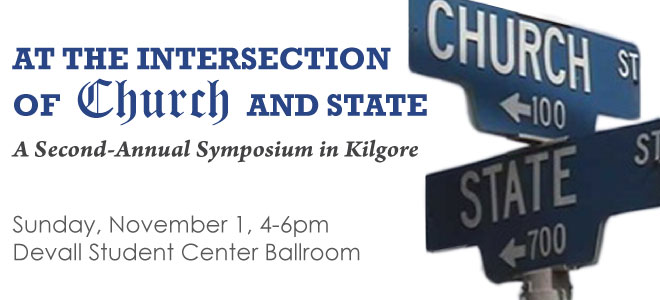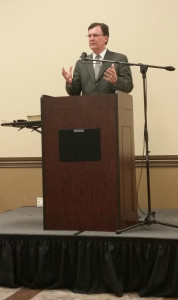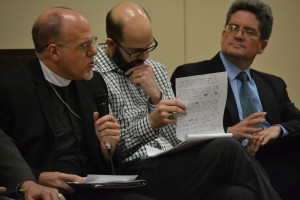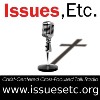 Nearly 150 people turned out Sunday, November 1, 2015, to consider “The Intersection of Church and State” in a Second-Annual Symposium in Kilgore, held from 4:00-6:00 p.m. in the Devall Student Center Ballroom on the campus of Kilgore College and “sponsored” by Pilgrim Lutheran Church, First Baptist Church, and St. Luke’s United Methodist Church. Those present heard a presentation from St. Luke’s pastor, Rev. Darwood Galaway, and then, after a short break with refreshments, discussed the topic further with the pastors of the other churches and a Kilgore College government instructor. The event was moderated by Terry Booker of Kilgore College.
Nearly 150 people turned out Sunday, November 1, 2015, to consider “The Intersection of Church and State” in a Second-Annual Symposium in Kilgore, held from 4:00-6:00 p.m. in the Devall Student Center Ballroom on the campus of Kilgore College and “sponsored” by Pilgrim Lutheran Church, First Baptist Church, and St. Luke’s United Methodist Church. Those present heard a presentation from St. Luke’s pastor, Rev. Darwood Galaway, and then, after a short break with refreshments, discussed the topic further with the pastors of the other churches and a Kilgore College government instructor. The event was moderated by Terry Booker of Kilgore College.

St. Luke’s United Methodist Pastor Darwood Galaway gives his portrait of a world without the word of God. Photo: J. Galler.
Rev. Galaway’s main presentation began with an editorial titled “A Portrait of a World Without the Word of God”, in which he suggested that, if the Bible is removed from society, some other ideology will take its place. For example, Galaway suggested, secular thinkers would provide a so-called “theory of everything” that ultimately would recognize human beings as “gods”, and he traced steps that are already taking place along those lines, such as teaching the language of science instead of faith and the decline of the traditional family model. Rev. Galaway also surveyed the history leading up to the current U.S. Church-State configuration, and so he spoke of the importance of a covenant relationship with God: personal, familial, and “governmental”, recognizing that the theocracy of the Old Testament developed over time and eventually declined. The coming of Jesus Christ, Galaway explained, brought a kingdom within a kingdom, the Church operating in the state, with various moral imperatives. Galaway cautioned against the co-opting of the Church by the state, and he ultimately offered a picture of a plurality of different “churches” and the state tolerating one another. (Audio of Rev. Galaway’s presentation is available here.)

Pilgrim Lutheran Church Pastor Jayson S. Galler explains the Bible’s teaching of “Two Kingdoms”, before his fellow panelists Jeff Stanglin of Kilgore College and Dr. Glenn Young of First Baptist have their turns responding to Rev. Galaway’s presentation. Photo: James Draper, Kilgore News Herald.
Before fielding questions from the audience with Rev. Galaway, the three panelists responded to his presentation. For example, the Rev. Dr. Jayson S. Galler of Pilgrim Lutheran Church mentioned the Bible’s teaching and Lutherans’ confessing the so-called “Two Kingdoms” doctrine: the state, where the law is central, and the Church, where the Gospel of the forgiveness of sins by grace through faith in Jesus Christ is central. Jeff Stanglin, J.D., Kilgore College Government Instructor, referred to the government’s struggle to balance rights and interests in a religiously diverse society and to the decision to “separate” government and religion in America’s founding documents in order to avoid the tyranny of the majority and protect those with minority status. And, Dr. Glenn Young of First Baptist Church likewise spoke of the separation of church and state and how, rather than being oppressive, societies that are primarily Christian are more tolerant of people’s religious and other differences than those societies that are not primarily Christian. Audience members asked a number of different questions of the panelists, including how churches are dealing with the U.S. Supreme Court’s legalization of so-called “same-sex marriage”. (Audio of the panel discussion is available here.)
The Symposium was free. No donations were received from those attending, so the three “sponsoring” congregations divided the Symposium’s expenses equally.
On evaluation forms returned after the Symposium, the majority of respondents at least agreed that the Symposium as a whole was worthwhile, that its topic was interesting and relevant, that its format was appropriate, and that the facility used was fitting for the Symposium. Respondents had less consensus on the suitability of the Symposium’s date and time, and organizers had already tried to address that concern in planning for 2016.
The Third-Annual Symposium is scheduled for Sunday, October 30, 2016, from 3:00-5:00 p.m. (one hour earlier than previous years). Jeff Stanglin’s working title for that event is “Religion and Politics in the 2016 Election: What to Expect in a Religiously Diverse Society”.
Connected to the anniversary of the October 31, 1517, Reformation, the Symposia series began in 2014 with “One Lord, One Faith, One Baptism”. The purpose of the Symposia is to seek a deeper understanding of one another in our various church communities. Through the mutual sharing of knowledge and ideas, organizers believe that the Holy Spirit will draw people closer to that union that Christ desires for all (John 17:21-23).
The slider graphic and banner graphic on this page were adapted from the uncredited image found here. For media coverage of the Symposia series, click here.

